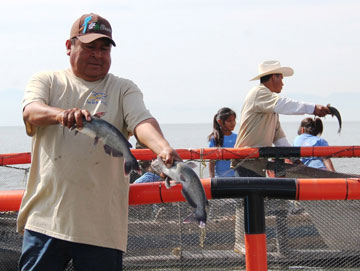Mezcala fishermen take charge of innovative fish farming project
- Details
- Published on Friday, 24 January 2014 11:27
- Written by Dale Hoyt Palfrey
 Lake Chapala’s natural fish population has declined at an alarming rate over the past several decades, primarily due to over-exploitation of the resource and antiquated capture methods that prevent new generations from flourishing.
Lake Chapala’s natural fish population has declined at an alarming rate over the past several decades, primarily due to over-exploitation of the resource and antiquated capture methods that prevent new generations from flourishing.
Fishermen from the village of Mezcala de la Asunción have started trading in their fishing nets for floating cages to become pioneers in an innovative and eco-friendly aquaculture system designed and fostered by the lakeside area non-profit association Luz de Malla.
After two and half years of participation in the Luz de Malla pilot project, six families of local fishermen have been rewarded for their efforts to master fish farming as a new and more profitable livelihood. Last month they assumed full responsibility for managing the field of circular breeding cages anchored a short distance off the shores of Mezcala Island, with each family taking charge of one of the pens.
Getting to this step is a major accomplishment for Luz de Malla, a small team of experienced professionals and committed volunteers dedicated to developing new means of independent employment for the people of rural communities bordering Mexico’s largest lake.
The first break-though was convincing fishermen to join the experiment, switching their ancestral practices for unchartered territory in aquaculture. A few brave souls took the bait, rising to the challenge of giving up the immediate and meager rewards of arduous daily fishing treks for the prospect of reaping long-term benefits from the seasonal raising and harvesting of a commercial catch.
Another challenge was designing and installing the fish cages, a task masterminded by Luz de Malla volunteer advisor Todd Stong, a professional engineer with ample experience in developing community projects in third world countries.
Domingo Ausin, a young Mexican biologist with a keen interest in environmental issues, was brought aboard as the project’s technical manager. Through months of trial and error, he and the fishermen determined that catfish proved to be a hardier species and more adaptable to Lake Chapala’s conditions than the tilapia they started out with. They discovered that they could keep the fish free of fatal diseases by treating them with a blend of garlic and oregano rather than commercial antibiotics, making for a healthy, organic and, as Luz de Malla volunteer Karuna Gomez Mont joked, a “pre-seasoned” food product.
Government approval and financing were additional hurdles for getting the pilot project off the ground. Through ardent lobbying, project promoters roped in the top officials at the Comision Nacional de Acuacultura y Pesca (Conapesca), an arm of the federal Ministry of Agriculture and Rural Development, to grant official backing along with the offering of a one million peso matching-fund package. Fund raising efforts largely supported by the expat community brought in more than 1.1 million pesos to seal the deal.
New stumbling blocks that emerged with the December 2012 change of administration at the federal level have also been surpassed. Elena Thelina Cárdenas Zermeño, assistant director at the Jalisco branch of Conapesca, sees the Mezcala pilot project as a viable model for alternatives to traditional fishing methods in Lake Chapala. She recently petitioned the agency’s central offices in Mexico City to cover the costs of an environmental impact study that will allow duplication of the Mezcala fish farm in other localities.
The aim is to launch a number of community-based aquaculture projects, limited to occupying no more than one percent of the lake’s surface area and situated at points that can sustain variations in its water level.
Luz de Malla marked the transition to an independent enterprise with a December 14 boat tour to the project site and picnic lunch on Mezcala Island, celebrating goodwill and fellowship between the budding fish farmers, the Luz de Malla team, its expat supporters and Mexico’s government.



